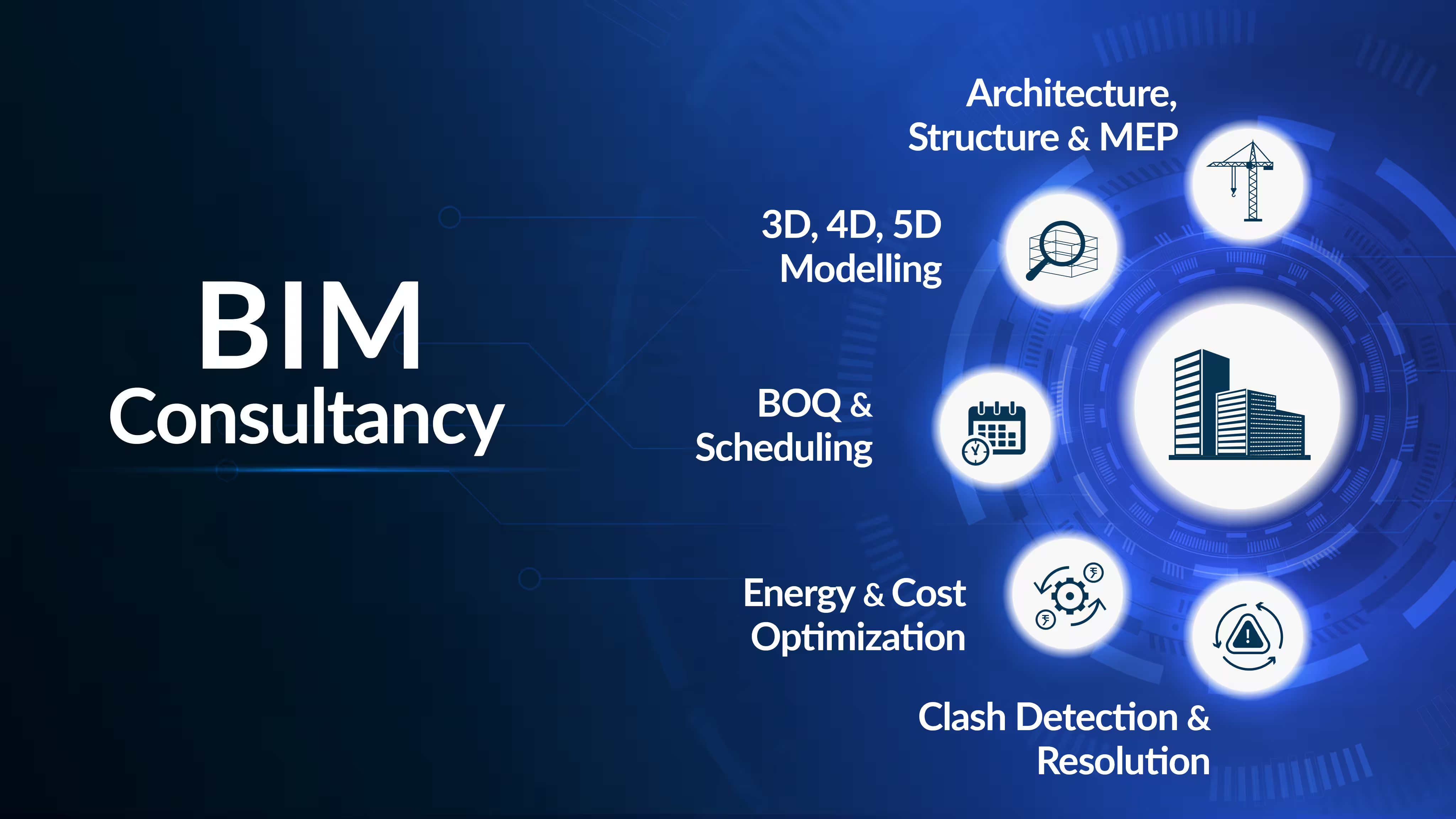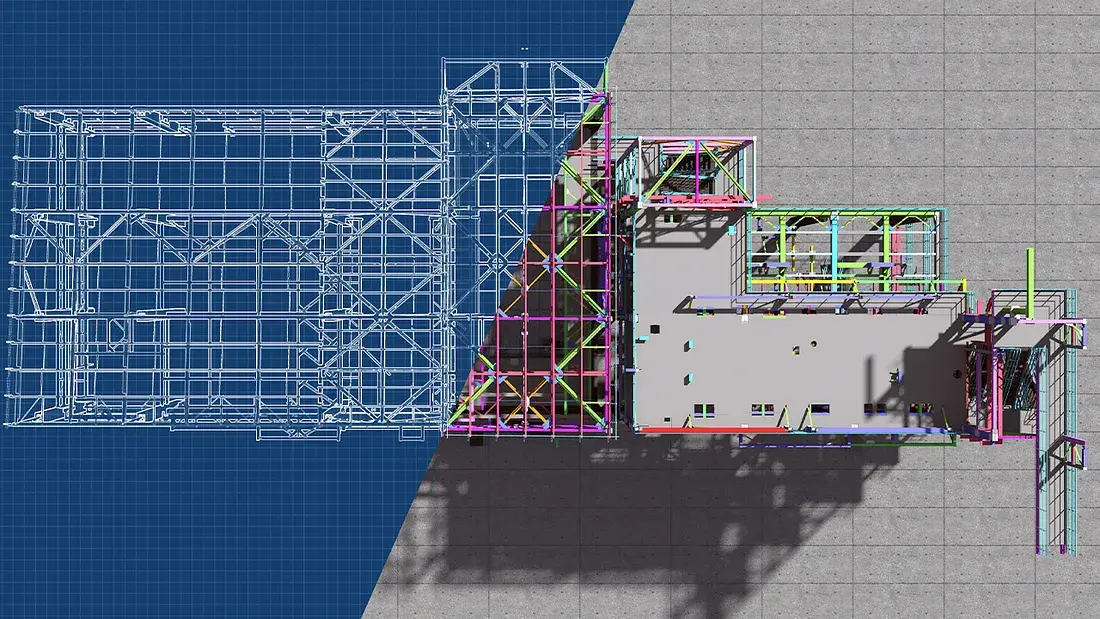How to Become a BIM Consultant: Skills and Experience Required

Table of Contents
As the AEC (Architecture, Engineering, and Construction) industry is embracing digital transformation, the role of BIM (Building Information Modelling) Consultants has become indispensable. BIM Consultants are crucial for today’s construction projects as they ensure projects are planned, designed, and executed efficiently with the utmost precision. They leverage 3D designs and preeminent tools like Navisworks, Revit, and more to facilitate the collaboration between architects, construction managers, and engineers and offer top-notch BIM consulting services.
But what does it take to become a BIM consultant? Professionals need to possess relevant skills and qualifications to start a career in this field. Read the blog to learn about the educational paths and qualifications required to become a BM consultant.
What is BIM Consultancy?
BIM consultancy involves providing expert guidance and support in using BIM for construction projects. BIM consultants help integrate BIM technology into the design, construction, and management processes to improve efficiency, collaboration, and project outcomes to ease construction workflows, optimise resource management, and deliver high-quality results.
BIM consultants offer various services, including project planning, software management, training, and quality assurance. Using advanced tools and techniques, BIM consultants ensure that all project stakeholders are aligned, reducing errors and enhancing the project's overall productivity.
Key Responsibilities & Scope of Work of a BIM Consultant
A BIM consultant plays a crucial role in the construction industry by ensuring that BIM processes are effectively implemented and managed. Here are the key responsibilities and work scope for BIM consultants:
1. Project Planning and Strategy
One of the primary responsibilities of a BIM consultant is to develop comprehensive BIM strategies and implementation plans. This involves understanding the project requirements and creating a roadmap that outlines how BIM will be integrated into the project.
2. Providing Training and Support
Another key responsibility is training and supporting the project team. BIM consultants educate team members on BIM guidelines, best practices, and the use of BIM software. This ensures that everyone involved is competent and confident in using BIM technology.
3. Software Management and Integration
BIM consultants are responsible for selecting and managing the appropriate BIM software tools, such as Navisworks and Revit. They ensure these tools are integrated seamlessly into the project workflow, enabling efficient 3D designs and data management.
4. Quality Control and Assurance
Maintaining high quality standards is essential in BIM consultancy. BIM consultants are responsible for conducting regular quality checks and audits to ensure that all aspects of the BIM model meet the required standards. They also ensure that the final outputs are accurate and reliable.
Also Check out: BIM Designer: Roles, Salaries, Scope, and Online Courses to Become One
Importance of a BIM Consultant in the AEC Industry
BIM consultants have become vitally important in the ever-evolving construction world. They bring a unique blend of technical expertise and strategic thinking to the table, making them crucial for the success of modern construction projects. Let’s explore the key reasons why architectural BIM consulting services are essential in the AEC industry:
1. Ensuring Compliance with BIM Guidelines
Adhering to industry standards and BIM guidelines is crucial for the success of any construction project. BIM consultants ensure that all aspects of the project comply with these standards, which helps maintain quality and consistency. They are well-versed in the latest guidelines and regulations, which means they can provide valuable insights and recommendations to ensure compliance. This is especially important for architectural BIM consulting services, where adherence to standards is critical for the project's integrity.
2. Enhancing Collaboration and Communication
BIM consultants enhance collaboration and communication among different stakeholders in a project. They use tools like Navisworks and 3D designs to create detailed models everyone can understand. This ensures that architects, engineers, and construction managers are all on the same page, reducing misunderstandings and improving overall project efficiency. Effective BIM consultancy helps align the goals of all parties involved, which is critical for successful project completion.
3. Optimising Resource Management
BIM consultants use their expertise to optimise resources, from materials to labour. By creating detailed models and simulations, they can predict the resources needed for each project phase and plan accordingly. It helps minimise waste and ensure that resources are used effectively, a key factor in reducing project costs. Effective resource management contributes to the sustainability of construction projects, an increasingly important consideration in today’s industry.
4. Providing Valuable Insights and Analysis
BIM consultants provide valuable insights and analysis that can significantly impact the project's success. They use advanced tools and techniques to analyse different project aspects, from design to implementation. This analysis helps identify potential risks and opportunities, which can inform decision-making and improve project outcomes. The insights provided by BIM consultants are based on data and real-time information, which means they are reliable and actionable. This is especially important for large and complex projects, where informed decision-making is critical for success.
Educational Background & Qualifications Needed to Become a BIM Consultant
To become a BIM Consultant, professionals must match educational background and qualifications criteria. Here is a detailed overview of the same:
1. Bachelor's Degree in Architecture, Engineering, or Construction Management
The first step towards becoming a BIM consultant is earning a bachelor’s degree in architecture, engineering, or construction management. These programs provide a solid foundation in design principles, construction techniques, and project management. Understanding the basics of building design and construction processes is essential for effective BIM consultancy.
2. Professional Certifications & Training Courses
After obtaining a degree, enrolling in specialised BIM courses at leading institutions like Novatr can significantly enhance your expertise. Many institutions offer training in BIM software like AutoCAD, Revit and Navisworks. These courses cover prominent topics like 3D designs, BIM implementation strategy, BIM Design, and a lot more. These certifications demonstrate your proficiency in BIM technologies and methodologies. For example, becoming an Autodesk Certified Professional in Revit shows that you have advanced skills in one of the leading BIM tools used in BIM consulting services.
3. Practical Experience
Gaining practical experience is an important aspect of becoming a BIM consultant. Many educational programs offer internships or cooperative education opportunities where you can apply your knowledge in real-world settings. Working on actual projects helps you understand the practicality of BIM design consulting and develop problem-solving skills.
4. Knowledge of Industry Standards and Guidelines
A deep understanding of BIM guidelines and industry standards is crucial for maintaining consistency and work quality. Many educational programs and certifications cover these standards to ensure you are well-versed in best practices. This knowledge is essential for developing effective BIM strategies and providing high-quality architectural BIM consulting services.
Also Check out: BIM Manager: Roles, Salaries, Scope, and Online Courses to Become One
Key Technical Skills and Certifications of a BIM Consultant
Becoming a BIM consultant is not an easy job as it requires a blend of technical skills and relevant certifications. These qualifications enhance your expertise and make you competitive in the architecture field. Here are the key technical skills and certifications that you must have to excel as a BIM consultant:
1. Proficiency in BIM Software
One of the fundamental skills for BIM consultants is proficiency in BIM software such as Revit, AutoCAD, and Navisworks. These tools are essential for creating and managing 3D designs. Being adept at these software applications allows you to produce detailed and accurate models, which are crucial for any BIM design consulting project.
2. Understanding of Architectural BIM Consulting Services
Having an in-depth understanding of architectural BIM consulting services is essential for any BIM consultant. It helps provide specialised services that cater to specific architectural project needs. It includes everything from conceptual design to detailed construction drawings and helps in answering questions about what BIM consulting is.
3. Certifications and Training
Obtaining relevant certifications and training is a key step in becoming a successful BIM consultant. Certifications such as Autodesk Certified Professional in Revit or BIM Management courses from recognised institutions like Novatr can significantly enhance your skills and knowledge. These certifications validate your skills and knowledge, making you a suitable candidate for BIM consultant jobs. Additionally, continuous training helps you stay updated with the latest BIM strategies and technologies.
4. Data Management and Analysis
Data management and analysis are crucial components of BIM consultancy. BIM consultants must be able to handle large sets of data, analyse them, and derive meaningful insights. This skill is particularly important when dealing with complex projects that require meticulous planning and execution.

Soft Skills and Competencies for a Successful BIM Consultant
Becoming a successful BIM consultant requires technical knowledge and an array of soft skills and competencies. Soft skills help solve the complexities and ensure effective communication with stakeholders. Here are the key soft skills for a successful BIM consultant must have:
1. Effective Communication
As a BIM consultant, clear and effective communication is paramount. You must communicate and act as a bridge between multiple stakeholders, including architects, engineers, and construction managers. Being able to convey complex BIM design concepts in simple terms is crucial. Additionally, strong communication skills help in explaining the benefits of BIM consulting services to clients who may not be familiar with the technology.
2. Problem-Solving Skills
BIM consultancy often involves dealing with complex challenges. Being able to identify issues and come up with effective solutions is a critical skill for BIM consultants. This could range from resolving conflicts in 3D designs to finding ways to improve the BIM implementation strategy. Good problem-solving skills ensure that projects stay on track and meet all requirements. Utilising tools like Navisworks helps detect and address potential problems early on.
3. Collaboration and Teamwork
Collaboration is at the heart of BIM consultancy. Successful BIM consultants must work seamlessly with different teams, ensuring that everyone is on the same page regarding the BIM implementation strategy. This includes coordinating with professionals from various disciplines, such as those specialising in 3D designs and Navisworks. Effective teamwork leads to more cohesive and integrated project outcomes.
4. Project Management
BIM consultants must be able to plan, organise, and oversee projects to ensure they are completed on time and within budget. Effective project management in BIM consulting means coordinating with different teams, managing resources, and keeping track of progress. It also includes implementing BIM strategies and following BIM guidelines to achieve the desired outcomes. Understanding what is BIM consulting helps in aligning the project goals with client expectations.
5. Critical Thinking
Critical thinking is essential for making informed decisions in BIM consulting services. It involves analysing information, evaluating options, and making decisions that benefit the project. BIM consultants need to assess the feasibility of BIM design plans, anticipate potential challenges, and develop strategies to overcome them. This skill is crucial for ensuring that the architectural BIM consulting services provided are effective and meet client needs.
Also Check out: BIM vs. Traditional Methods: Which is More Efficient for Civil Engineering Projects?
Training Certifications Required for Becoming a BIM Consultant
To become a proficient BIM consultant, obtaining relevant certifications is crucial. These certifications will help you gain all the relevant practical and soft skills required for a successful career. Take a look below at some key certifications that aspiring BIM consultants should consider:
1. BIM Professional Course for Architects & Engineers by Novatr
Novatr offers specialised BIM professional courses for Architects and Civil Engineers. These courses provide a comprehensive understanding of BIM fundamentals, covering essential topics such as BIM implementation, standards, and protocols. Participants learn to create and manage detailed BIM models, collaborate effectively within multidisciplinary teams, and apply BIM methodologies in real-world projects. The courses come with hands-on training with leading BIM software tools like AutoCAD, Revit, Graphisoft ArchiCAD, and Navisworks, ensuring that participants are well-versed in practical applications.
These programs emphasise the importance of integrating BIM into various stages of the project lifecycle, from design and construction to facility management. After course completion, participants will be equipped with the skills necessary to drive BIM adoption and deliver high-quality BIM projects efficiently.
2. BIM Practitioner Certification by Bre Academy
This course is tailored for professionals seeking to validate their BIM knowledge and skills. It focuses on the practical application of BIM principles and methodologies and covers key areas such as BIM execution planning, model coordination, clash detection, and information management. Participants gain a deep understanding of how to implement BIM processes in line with industry standards and best practices.
The course also addresses the legal and contractual aspects of BIM, ensuring that professionals are aware of the implications of BIM adoption in their projects. Through a combination of theoretical lessons and practical exercises, aspiring BIM consultants can develop the competence required to manage BIM projects effectively.
3. BIM Practitioner Certification by Bre Academy
The BIM Manager Certification offered by the Royal Institution of Chartered Surveyors (RICS) is designed for professionals aiming to take on leadership roles in BIM implementation. This certification program covers advanced BIM topics, including strategic planning, project management, and stakeholder engagement. The course also teaches about the importance of data management, ensuring that BIM models are accurate, reliable, and accessible throughout the project lifecycle.
4. Autodesk BIM Certifications
Autodesk offers a range of BIM certifications that cater to different levels of expertise and specialisations. These certifications are ideal for professionals who use Autodesk's BIM software tools, such as Revit, AutoCAD, and Navisworks. The Autodesk BIM Certifications are designed to validate proficiency in specific BIM applications and demonstrate a deep understanding of BIM workflows. It covers a plethora of topics like modelling, documentation, analysis, and collaboration. By earning an Autodesk BIM Certification, professionals showcase their technical skills and commitment to staying current with industry advancements.
Conclusion
BIM consultants are integral to the modern construction industry, encompassing a wide range of responsibilities and requiring a strong educational background, technical skills, and soft competencies.
If you are an AEC professional or student seeking to advance your career in BIM consulting, you can consider enrolling in the BIM Professional Course for Architects by Novatr. This comprehensive course offers in-depth BIM training and will help you learn the vital expertise needed to excel in the industry.
Do not forget to visit our Resources Page to stay updated with the latest industry trends and insights!

 Thanks for connecting!
Thanks for connecting!

.png)
.jpg)




.jpeg)

